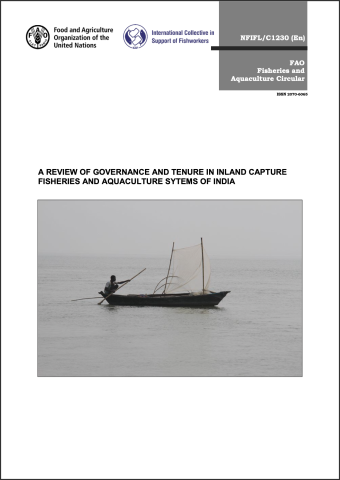
Being able to access fish and other aquatic resources in inland waters for nutrition and food security is essential for rural populations in many developing countries and inland fisheries contribute significantly to achieving the Sustainable Development Goals. The Voluntary Guidelines on the Responsible Governance of Tenure of Land, Fisheries and Forests in the Context of National Food Security, and the Voluntary Guidelines for Securing Sustainable Small-Scale Fisheries in the Context of Food Security and Poverty Eradication, are tools allowing governments to strengthen governance and develop policies that secure equitable distribution of benefits and empower stakeholders.
This document examines the tenure systems, rights and governance issues in the vast, diverse and complex inland fisheries of India. The objective is to highlight how inland fisheries have been changing and the associated challenges for governance and tenure. The legal and policy contexts, within which fishing in rivers, wetlands and estuaries takes place, are described as well as the diversity of fishing activities and practices in the different environments found in India, which include inland capture fisheries, culture-based fisheries and freshwater aquaculture systems. Multiple drivers of change that affect inland fisheries are discussed from within the fisheries sector and from wider social, economic and environmental contexts. The ways in which formal and informal institutional arrangements and customary access regimes interact with each other are highlighted. The potential outcomes of institutional change and emerging policies for ecological sustainability, economic equity and social justice are discussed, with a focus on capture fisheries within India’s inland fisheries.




